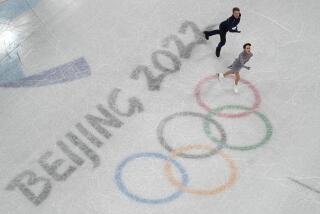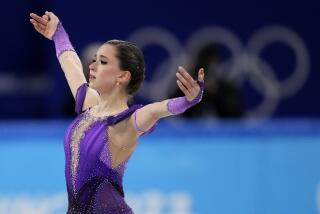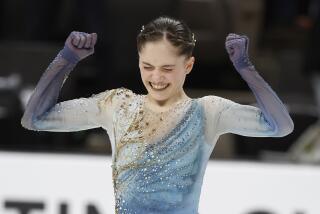ISU Changes Judging System
- Share via
Prodded into overhauling figure skating’s judging procedures after a controversy at the Salt Lake City Olympics, the International Skating Union on Wednesday approved a computer-reliant scoring system that offers many criteria for assessing skaters’ performances but permits judges to retain anonymity.
A U.S. proposal to list judges’ names on protocol sheets after each event was defeated when it failed to get two-thirds approval from voters at the ISU Congress in Scheveningen, Netherlands. Chuck Foster, president of U.S. Figure Skating, said his organization would “constantly lobby” for greater accountability among judges.
“We’re disappointed because transparency is what we’re after,” he said by telephone. “Ultimately, people will see it needs to be accepted.”
He was otherwise approving of the system, which was tested at 2003-04 Grand Prix events and will be used at all international events next season and at the 2006 Turin Olympics. The 2005 U.S. championships will be judged under the old 6.0-based system because U.S. Figure Skating’s governing council isn’t scheduled to vote on the new system before then.
Under the Code of Points, skaters get a technical mark and a program component mark, which are added to produce a cumulative score. Judges rate skaters’ moves on a fixed scale pegged to the difficulty of each element but can add or subtract points for execution. They also award points for choreography, interpretation and performance. Such precision was lacking in the old system, which gave skaters one mark of up to 6.0 for technical elements and another maximum of 6.0 for presentation.
Each panel will have up to 12 judges. Nine randomly selected scores will count and the high and low scores will be eliminated. Fewer judges will be impaneled at smaller competitions.
“It’s a completely different way to look at figure skating,” Foster said. “It’s not like the old judging system, in which judges placed skaters. Under this system, anybody can win.”
ISU President Ottavio Cinquanta has bucked old national and philosophical alliances in advocating reform. His efforts intensified after French judge Marie-Reine Le Gougne claimed she had been pressured by French federation chief Didier Gailhaguet to place a Russian pair over a Canadian pair at Salt Lake City. She later recanted, but the subsequent uproar led to both pairs getting gold medals.
The new system is designed to reward many facets of skating and minimize the chances of biased judging. But Frank Carroll, coach of Olympic bronze medalist Tim Goebel, said he believed there was still room for bloc voting.
“I don’t think this means a hill of beans unless they do redistricting of judges and determine how many can come from what areas,” said Carroll, who works in El Segundo. “This is not going to clean it up.
“It makes you pay attention to different parts of skating, so it’s not a negative thing and it’s not going to hurt. They’re trying to do something and it’s a step in the right direction, but they need to say you can have only a certain number of Eastern European judges, Western European judges, judges from North America and Asia. In this system, what if you got no Americans on a panel? They can push in whatever they want.”
Robin Wagner, who coached Sarah Hughes to a gold medal in 2002 and now coaches world silver medalist Sasha Cohen, agreed the new system had pitfalls and pluses.
“Things still need to be tweaked, such as the point values,” she said. “And hopefully, we can make progress in breaking blocs.... It’s a big step, and it’s changing a system the skating community has been comfortable with for years. You can’t get it all at once. It’s a step forward at this point, and hopefully we can get something done about the judges’ anonymity.”
*
Carroll and colleague Ken Congemi have agreed to coach Jenny Kirk, who finished third at the 2004 U.S. championships. Kirk had trained with Richard Callaghan. Carroll and Congemi also coach Junior Grand Prix champion Evan Lysacek.
More to Read
Go beyond the scoreboard
Get the latest on L.A.'s teams in the daily Sports Report newsletter.
You may occasionally receive promotional content from the Los Angeles Times.







